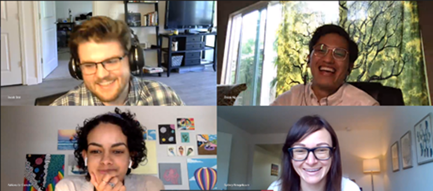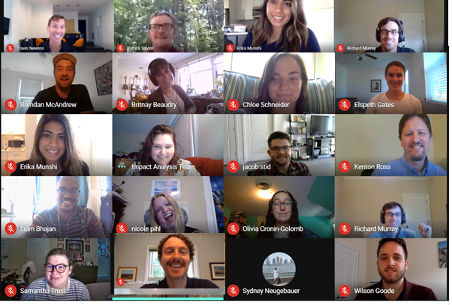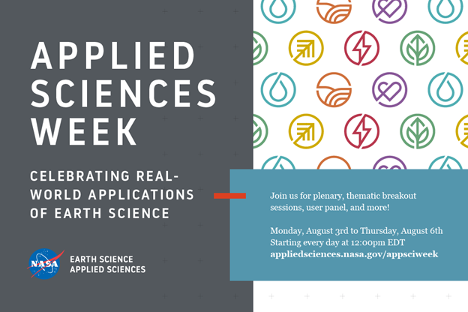Summer 2020 End of Term

In summer 2020, the DEVELOP National Program hosted its first fully virtual term. To continue offering 10-week capacity building opportunities and continue the DEVELOP participant experience, the program had to successfully overcome numerous obstacles. From learning and transitioning to new virtual tools and providing remote technical training, to collaborating and networking with partner organizations remotely, DEVELOP participants experienced a term of many “firsts.”
The DEVELOP summer term began virtually on June 1st and will conclude on August 7th. Sixty-five participants are working remotely on fifteen projects that highlight NASA Earth observation capabilities relative to environmental issues and concerns for enhanced policy and decision-making. The participants are working from five different time zones and twenty-three different states across the nation; however, they are each linked to one of DEVELOP’s eleven locations.

DEVELOP participants utilize video conferencing tools to meet with their science advisor. Image credit: Sydney Neugebauer
To support conducting projects remotely, DEVELOP utilized software tools for a virtual working environment. Managed through a contract with Science Systems and Applications, Inc. (SSAI), DEVELOP was able to implement the use of collaborative software tools, which proved to be incredibly valuable for communication within project teams, within DEVELOP locations, and even program-wide. Through SSAI, DEVELOP also implemented the use of virtual machines. The virtual machines allow all participants to have access to the software and processing capabilities needed to complete their projects.

DEVELOP Software Carpentry participants. Image credit: Danielle Quick
During the first three weeks of the summer term, DEVELOP also did another “first” and hosted a program-wide Software Carpentry workshop. This workshop introduced participants to coding best practices and facilitated use of scripting in projects. The workshop was divided into several different segments–Unix shell, management with Git, and Python and R for scientific analyses. Some of the sessions were offered twice to allow participants across time zones to participate. The DEVELOP Software Carpentry workshop reached fifty-four participants through eight training sessions, which resulted in over 865 hours of training! The workshop couldn’t have been possible without the assistance of eight instructors, who worked together to lead the training sessions. This workshop increased DEVELOP’s technical training capability at the program level and was a significant value-add to this virtual term–particularly for locations that did not previously have access to formal technical instruction.
Another “first” for DEVELOP was working to support Bhutan activities through an Interagency Agreement with the U.S. Department of State. DEVELOP is providing technical training and skill-building to Bhutanese scholars in the U.S. by conducting rapid feasibility studies for mutual learning on how to apply NASA and Earth science data to environmental decision-making in Bhutan. In the summer 2020 term, nine Bhutanese scholars are working on two projects – Southern Bhutan Ecological Forecasting from the Maryland–Goddard DEVELOP location and Bhutan Water Resources from the Alabama–Marshall DEVELOP location. DEVELOP assembled two teams of participants with interdisciplinary backgrounds ranging from psychology to civil engineering, global supply chain management, and international business. The participants used their diverse skill sets, along with the guidance from NASA and partner advisors, to conduct their DEVELOP feasibility projects and build their capacity in remote sensing and GIS. DEVELOP will continue to host Bhutanese scholars for ten-week internships during the summers of 2021 and 2022.

Save the Date card for Applied Sciences Week. Image credit: U.Group
The NASA DEVELOP National Program will have another “first” at the end of this summer term, when DEVELOP’s summer closeout presentations will be included in a broader, virtual event. NASA’s Applied Sciences Week will be held from Monday, August 3rd through Thursday, August 6th and will highlight the annual activities of our Applied Sciences and Capacity Building Programs, with a central focus on engaging DEVELOP participants. The showcase will include highlight presentations from 15 summer DEVELOP projects, interactive sessions, and guest presentations from NASA and other organization leaders. Each day, beginning at 12:00pm EDT, will start with a 2-hour plenary session with programmatic overviews, panels, thematic breakout sessions, and project highlights by geographic impact. If you are interested in attending, visit the Applied Sciences Week website to register. There is no cost to register, and it will provide access links and updated information for the plenary and breakout sessions.
While the NASA DEVELOP National Program had to overcome obstacles to host a completely virtual summer 2020 term, all participants in the program learned new technologies, received technical training, and gained exposure to working with emerging remote sensing and geographic information system technologies. In addition to building capacity within the program’s participants, DEVELOP built the capacity of the organizations partnered with the 15 projects this summer by demonstrating how NASA Earth observations can be utilized to address environmental community concerns around the world.